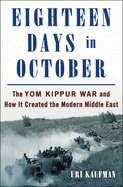
Relatively small, short conflicts can be lost too easily to the dustbin of history, given the multitude and magnitude of wars in the 20th century. In Eighteen Days in October, Uri Kaufman, an American real estate developer and scholar, goes far toward ensuring this will not be the case for 1973's Yom Kippur War between Israel and Egypt and Syria. Kaufman's work, written with propulsive narrative flair and a readable style that does not overlook the finer details, is an impressive achievement of independent scholarship, and a vital resource for students and readers curious about the conflict. Primarily but not exclusively focused on Israeli government, military, and society, Kaufman begins with a brief recounting of the conflicts, skirmishes, and ceasefires leading up to the Yom Kippur War. This grounds readers in the key context, concerns, and geographies, while introducing many larger-than-life characters of the time, including Israeli prime minister Golda Meir, Egyptian president Anwar Sadat, and U.S. Secretary of State Henry Kissinger.
But it is in the war narrative that Kaufman truly shines. With copious and detailed citations to other scholarly works, interviews, and archival government files--many of which were only recently declassified--Eighteen Days in October is a fine work of military history. Brought to life are well-known stories, but also intelligence reports, logistical quandaries, fierce backroom deliberations with grand strategizing, and minute tactical pivot points. Kaufman also provides thoughtful reflection on the consequences and the scapegoating, sharing his expert conclusions on a region--and a world--forever changed by the Israeli victory and the country's solidification. --Walker Minot, writer and editor

